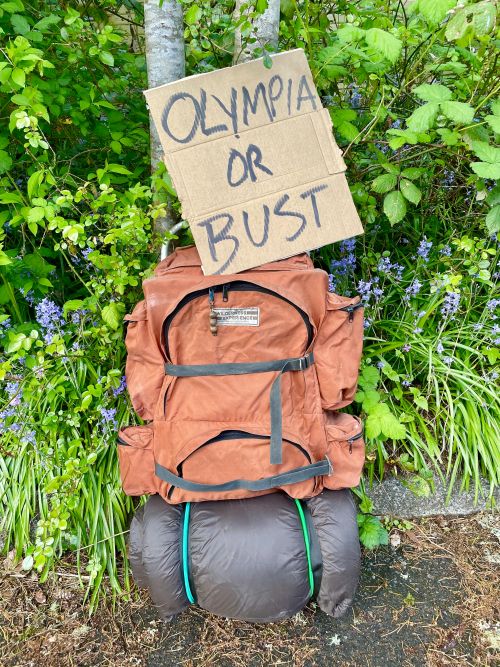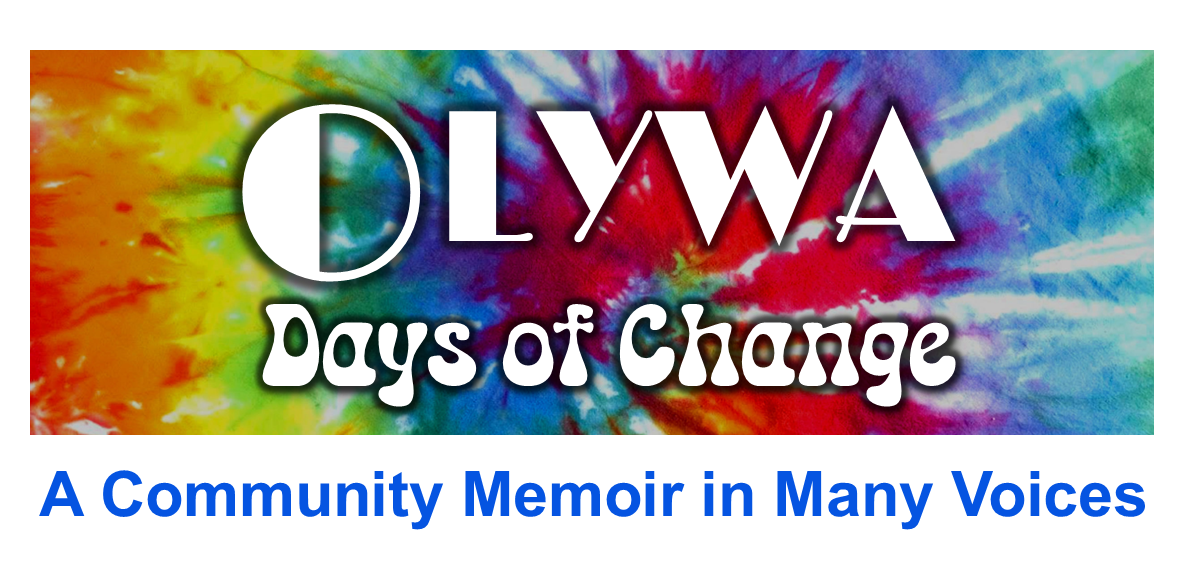ARRIVALS
Going to the Left Coast
By Anna Schlecht
The name “Olympia” sounded musical when I first heard it one spring morning, just before the breakfast shift at the Main Course, my hippie restaurant in Madison, Wisconsin. I had plopped down at a table of co-workers to chat over coffee. I was tired, having spent a miserable night in a third-story apartment where my sleep was shattered by a noisy late-night crime scene on the sidewalk below.
Maybe someone died or maybe was just hurt really bad; I never found out. The whole raucous scene was disturbing, first because I couldn’t sleep, and second because I was afraid that I was becoming numb to crime as a fact of life. I did not want to become one of those people who ignored the tragedy of others.
That morning, I heard one of my friends announce, “Yep! I’m moving to Olympia!” It sounded like a mythical refuge from street crime, a verdant world of organic food, a promised land for hippies. It jolted me awake. Yes! That was the place where I could restore my endangered sense of humanity.
My worldly friend regaled us with tales of this far-off place in the Pacific Northwest. “You can actually get a job shoveling cow shit on mushrooms! People live in cabins and hay-bale houses! Everyone goes to potlucks instead of bars!” That last part sounded far-fetched to a Wisconsin native. But having recently gotten sober, I was intrigued by the idea of hanging out in a setting that didn’t involve bar fights.

Unlike many newcomers, I wasn’t drawn to Olympia to attend college at Evergreen. Instead, I followed the people who were. These were people who wanted to ground their activism by learning radical history and political theory; and then to find ways to apply what they learned. Except for the going-to-college part, it sounded like the promised land to me.
So that was it. I was moving to Olympia.
Over the next year, I did as much planning as an eighteen-year-old is capable of: I found a US road map, looked up a list of worker collectives in the Northwest, and saved money to buy a backpack. Done.
While I didn’t realize it at the time, I was part of a huge chain-migration of hippies moving west in search of a better life on the “Left Coast.” Once established, the first migrants would write home, singing the praises of what they had found. Communes! Endless forests! The vast Pacific Ocean, so much bigger than Lake Mendota! It was even bigger than Lake Michigan, the only body of water I had ever seen that stretched beyond the horizon.
Those of us from the interior had grown up stifled by our families, even more so by rigid folkways. Even in progressive Madison, the protective crust of our hippie culture barely shielded us from a sense of impending doom, of assimilation into a life we wanted no part of.
My inner soundtrack was filled with songs of travel like Joni Mitchell’s 1976 album Hejira. Like many people I knew, I was compelled to leave home to find a different world where new ideas washed up on unfamiliar shores. By the mid-1970s, California seemed like a worn-out utopia, but the Pacific Northwest had all the alluring mystery of a newly discovered planet.
Apparently I was not alone. Thousands of young people left by VW bus, Greyhound, train or thumb. Some of us headed straight out to the countryside and started collective farms in Eastern Washington or Oregon. Others settled in small towns like Olympia, Eugene, and Bellingham. I figured that Olympia was the place for me.
When the time came to leave, I prepared to hit the road with my backpack, guitar, and hopefully a companion. I had been chatting up my friends, trying to muster up a fellow traveler. In the end, my hitchhiking pals wimped out. They were probably rattled by grim reports of the abduction and murder of hitchhikers. Undaunted, I set off alone, buoyed by a naive sense of immortality.
My eyes were filled with anticipation when my last ride ended in downtown Olympia. I looked up and down the main street called Fourth Avenue, searching for signs of the promised land: collective restaurants, food co-ops, or any other hallmark of Left Coast civilization. Instead, I saw logging trucks rolling down the street, loaded with the biggest trees I’d ever seen, wider across than VW bugs. The air was filled with strange new smells, a mash-up of the Salish Sea’s saltwater with the failed-septic-stench of Capitol Lake. Much later, I learned this lake was really the Deschutes River, trapped by a dam and clogged with all kinds of nasty things.
In my little booklet for hippie travelers, I had an address for the Artichoke Mode, a collective restaurant. I easily found the place, identified by a hand-painted sign on the window featuring a huge artichoke. But my excitement was short-lived–it was closed! With no Plan B, I must have looked so forlorn that a woman across the street took pity on me.
“Honey, they’re closed!” I turned to see a red-haired woman in a light blue marching band jacket with a sparkly purse slung across her shoulder, jaywalking across the street toward me. “Are you hungry? Come with me and I’ll buy you a sandwich down at the Spar!”
My rescuer was the one and only Laura May Abraham Booker, owner of the Rainbow Grocery on the other side of the street. Unknowingly, I had the good fortune to meet one of the pivotal figures in downtown Olympia. Laura May was what my grandfather from Milwaukee would have called a “natural-born ward boss,” except for hippies, not voters. Grabbing my arm, she steered me down Fourth Avenue to the Spar.
Once there, Laura May introduced me to everybody, including Shirley, the world-famous Spar waitress. I left my backpack and guitar in a corner and settled into a two-seater booth with Laura May. For the next hour, she leaned back over her seat like a cabbie to chat up people coming and going. Everyone knew Laura May.
“Hey, meet Anna,” she told everyone. “She just got here from Madison, Wisconsin, and she plays guitar!” Apparently, that was all people had to know.
At least half the tables were filled with locals—guys with Brylcreem in their short hair and women with hairdos held in place with Aqua Net. Everyone else had massively unruly mounds of hair—curly or straight, all spilling out across their shoulders, even onto the tables—just like me. I thought I had found my people.
That first night, I went home with a piano player named John Alkins and his girlfriend Jolie, the first of a long string of sofa accommodations. Apparently, my guitar was enough of a background check for them to trust me. John and Jolie seemed to know all the musicians in town. John worked for John Grace Piano Movers, a local icon in the small but growing Black community. On the second night of my stay, they took me to a coffeehouse called Apple Jam, where I met dozens more people.
“Didn’t you say you knew other people here in Olympia?” asked John on the third night.
I took the hint, packed up my meager belongings and left. Still unable to find my friend who was moving to town, I circled back to Apple Jam and found other people who let me stay with them for a while. I continued to couch surf while looking for work and a more permanent place to live. Fortunately, I didn’t encounter any mass murderers. Some folks were odd, perhaps, but not dangerous.
As I wandered Olympia, I met people with whimsical names like Moo; “free boxes” were everywhere I looked; fruit of all kinds was hanging over alley fences, ready to eat. It was as close to a hippie promised land as I could imagine.
After a few weeks, the golden warmth of late summer turned to the cool rains of fall. Undeterred, I sloshed around town, excited to meet even more musicians, activists, and others. Slowly, I realized that hippies weren’t really the people I was looking for.
Without consciously knowing it, I had moved two thousand miles away from my family to come out—it was other gay people I was looking for. Once I admitted that to myself, it seemed like Olympia was crawling with lesbians. In my daily flight path, looking for work and trying to meet people, I often circled by Laura May’s Rainbow grocery store. I had no idea how she identified, but her store sure seemed to draw a lot of lesbians. They seemed much older and wiser, as does anyone older than nineteen to an eighteen-year-old.
I had found a new world that didn’t revolve around 1970s sit-coms or rigid gender roles. Gay people were part of the community, social justice was a way of life, activism was our daily bread. It felt like the revolution that never happened was alive and well, though slow moving in Olympia.
In a few short months, I had fully landed. Olympia had become my home.
We encourage readers to contact us with comments and corrections. Disclaimer
